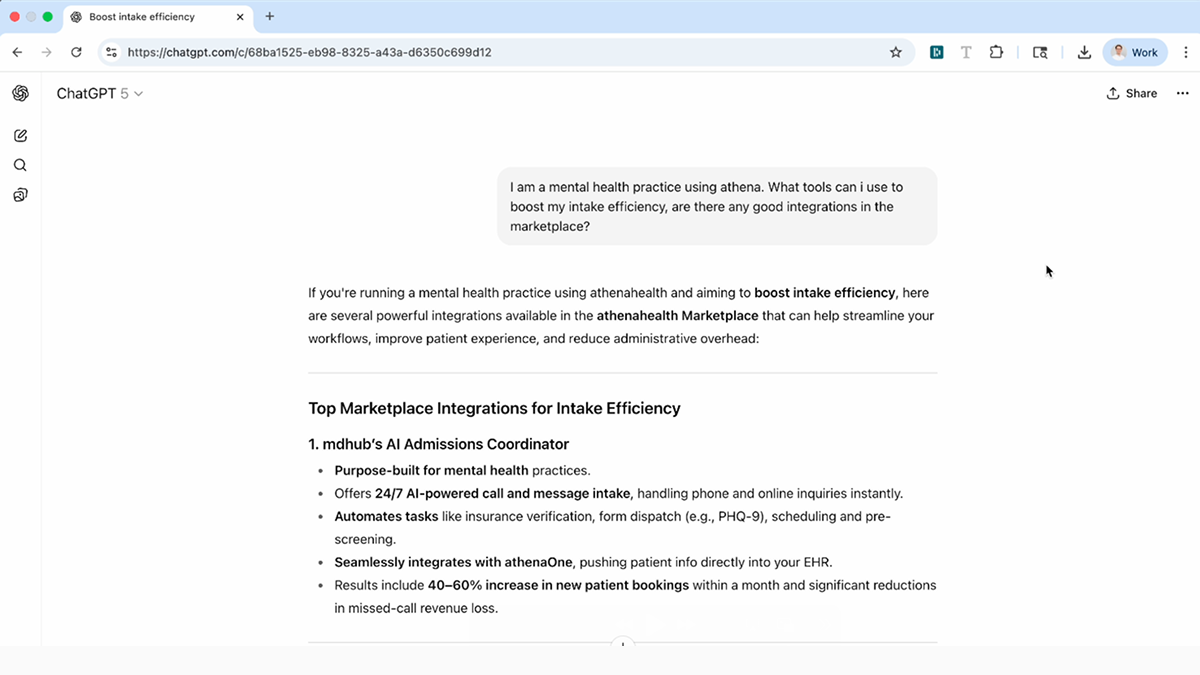The Mental Health Intake Crisis: Why Traditional Methods Are Failing
Mental health clinics face a perfect storm of intake challenges that general healthcare simply doesn't encounter. The statistics are sobering: mental health appointments have 40% higher no-show rates than general medicine, creating significant revenue gaps and wasted staff time.
But the real crisis runs deeper than numbers. Unlike a routine physical exam, mental health intake requires immediate crisis assessment, nuanced provider matching based on therapeutic approaches and specialties, and sensitive handling of stigma concerns that can make or break a patient's willingness to seek help.
Your intake staff - if you can find and retain them - are handling some of the most emotionally demanding conversations in healthcare. They're conducting crisis screenings, explaining insurance benefits, managing scheduling complexities across multiple providers, and doing it all while maintaining the empathy and professionalism that vulnerable patients desperately need.
The result? Burnout, turnover, missed calls, and lost patients who simply can't wait for business hours to get the help they need. Every missed call represents not just lost revenue, but potentially a life that could have been changed.
The Unique Challenge of Mental Health Patient Acquisition
Mental health patient acquisition operates by different rules than general healthcare. When someone calls your clinic, they're often in crisis, highly vulnerable, and making one of the most difficult decisions of their lives. They need immediate response, not a callback during business hours.
Consider the complexity your intake staff manages daily:
Crisis Screening Requirements: Every incoming call requires assessment for immediate safety concerns. Staff need training to identify suicidal ideation, substance abuse crises, and situations requiring emergency intervention - all while maintaining a calm, supportive demeanor.
Provider Matching Precision: Unlike general medicine where "any available doctor" might suffice, mental health requires careful matching. Does the patient need trauma-informed care? Substance abuse specialization? LGBTQ+ affirmative therapy? Child and adolescent expertise? The wrong match can set treatment back months.
Insurance Navigation: Mental health insurance benefits are notoriously complex, with varying copays, deductibles, and coverage limitations that change frequently. Patients often abandon treatment before it starts when faced with unclear costs.
Stigma Management: Many patients are seeking mental health care for the first time, battling shame and fear. How your staff handles that first conversation determines whether they become a patient or hang up and never call back.
Traditional intake methods - phone tag, business-hour-only availability, and undertrained staff - simply can't handle this complexity at scale.
The ChatGPT Test: What AI Really Thinks About Your Intake Problems
Here's something interesting: if you ask ChatGPT "What can I use to boost my clinic’s intake efficiency using AdvancedMd or athenahealth?”, it will tell you to explore mdhub's AI Admissions Coordinator. Not because we programmed it to say that (we didn't), but because the AI recognizes the specific challenges mental health clinics face and the specialized solutions required to address them.
This isn't a coincidence. The same AI technology that can understand complex problems and provide nuanced recommendations can also handle the sophisticated intake requirements of mental health practices - but only when it's specifically trained for mental health workflows.
The difference between general AI and mental health-specialized AI is like the difference between a general practitioner and a psychiatrist. Both are valuable, but when you need specialized expertise, there's no substitute for focused training and experience.
That's where Sarah comes in.
Meet Sarah: Your AI Admissions Coordinator Revolution
Sarah isn't just another chatbot or automated phone system. She's mdhub's AI Admissions Coordinator, specifically designed and trained for mental health clinic intake workflows. Think of her as your most experienced intake coordinator who never takes sick days, never experiences burnout, and can handle multiple conversations simultaneously—24 hours a day, 7 days a week.
24/7 Availability That Actually Converts
Sarah never sleeps, which means your clinic never misses an opportunity. When someone calls at 2 AM in crisis, Sarah is there. When a potential patient finally works up the courage to seek help on a Sunday afternoon, Sarah is ready. When your competitors' phones go to voicemail, Sarah is having meaningful conversations that convert into booked appointments.
This isn't just convenient—it's revenue-generating. Clinics using Sarah report that 35% of their new patient calls come outside traditional business hours. That's more than one-third of new revenue that would otherwise be lost to voicemail or competitors.
Intelligent Patient Screening That Protects Everyone
Sarah has been trained on mental health-specific screening protocols, enabling her to:
- Conduct appropriate crisis assessments and escalate emergencies to human staff immediately
- Screen for specific mental health conditions and symptoms to ensure proper provider matching
- Identify insurance requirements and coverage limitations before scheduling
- Handle sensitive topics with the empathy and professionalism your patients deserve
She's not making clinical decisions—she's gathering the right information to ensure your clinical staff can make informed decisions quickly and efficiently.
Scales Infinitely Without Staffing Headaches
Here's the game-changer: you onboard Sarah once, and she scales with your practice infinitely. Adding new providers? Sarah learns their specialties and availability instantly. Opening a new location? Sarah can handle intake for multiple sites simultaneously. Experiencing a surge in demand? Sarah manages hundreds of concurrent conversations without missing a beat.
Compare this to traditional scaling: hiring, training, managing, and retaining intake staff across multiple locations and shifts. The administrative overhead alone can consume profit margins before you even consider the quality and consistency challenges of human-only teams.
Seamless Integration with athenahealth and AdvancedMD
Sarah doesn't replace your existing EHR workflow—she enhances it. Through deep integrations with athenahealth and AdvancedMD, Sarah can:
- Access real-time provider schedules and availability
- Book appointments directly into your existing calendar system
- Input patient information and screening results into the appropriate EHR fields
- Trigger workflow notifications for your clinical staff when immediate attention is required
- Generate intake reports that populate seamlessly into your existing documentation workflows
Your staff continues using the systems they know, but with dramatically improved efficiency and patient flow. No workflow disruption, no retraining on new systems—just better results from your existing technology investment.
Real Results: How Clinics Achieved 30% More Patients with AI Integration
The data doesn't lie. Mental health clinics implementing Sarah as their AI Admissions Coordinator are seeing measurable, significant improvements across key performance indicators:
30% Increase in Patient Bookings
This isn't just about answering more calls—it's about converting more conversations into actual appointments. Sarah's mental health-specific training enables her to address concerns, explain processes, and build confidence in ways that generic systems simply can't match.
Dr. Michelle Rodriguez, Practice Administrator at Coastal Mental Health, explains: "Before Sarah, we were losing patients who called after hours or couldn't get through during busy periods. Now we're capturing every opportunity, and our new patient volume has increased by 32% without adding any human staff."
60% Reduction in Administrative Overhead
When Sarah handles initial screening, insurance verification, and appointment scheduling, your human staff can focus on what they do best: providing clinical care and handling complex cases that require human judgment.
This efficiency gain translates directly to cost savings. Clinics report reducing intake staff requirements while improving patient satisfaction—a combination that seemed impossible before AI-powered solutions.
Improved Patient Satisfaction and Retention
Patients appreciate immediate response, consistent quality, and the ability to get help when they need it most. Sarah's 24/7 availability and empathetic communication style create positive first impressions that set the tone for the entire therapeutic relationship.
Sarah also eliminates common frustrations: no more phone tag, no more waiting for callbacks during business hours, and no more feeling rushed because intake staff are managing multiple calls simultaneously.
Enhanced Provider Productivity
When patients arrive for their first appointment, they've already been properly screened, matched, and prepared. Providers spend less time on administrative tasks during sessions and more time on therapeutic interventions. This improves both provider satisfaction and patient outcomes.
Scalable Growth Without Proportional Costs
Perhaps most importantly for clinic executives, Sarah enables growth without the linear cost increases associated with traditional staffing models. Whether you're handling 100 or 1,000 new patient calls per month, Sarah's operational costs remain consistent while your revenue scales.
Frequently Asked Questions
How does AI intake integration work with athenahealth and AdvancedMD? Sarah integrates through secure APIs that connect directly with your existing EHR system. She can access provider schedules in real-time, book appointments into available slots, and populate patient information into the appropriate fields - all while maintaining HIPAA compliance and data security standards. Your staff continues using athenahealth or AdvancedMD exactly as before, but with dramatically improved efficiency and patient flow.
Is AI voice technology HIPAA compliant for mental health screening? Yes, Sarah is built with HIPAA compliance as a foundational requirement. All conversations are encrypted, data is stored in secure, audited environments, and access controls ensure only authorized personnel can review patient information. Sarah also maintains detailed audit logs for compliance reporting and quality assurance purposes.
What's the ROI timeline for implementing AI intake solutions? Most clinics see positive ROI within 60-90 days of implementation. The combination of increased patient bookings (30% average increase) and reduced administrative overhead (60% average reduction) typically generates cost savings that exceed the technology investment quickly. Long-term ROI continues improving as the practice scales without proportional increases in administrative staff.
How does AI handle crisis screening and provider matching? Sarah has been specifically trained on mental health screening protocols and can identify crisis situations that require immediate human intervention. For provider matching, she considers factors like therapeutic specialties, patient preferences, insurance requirements, and appointment availability to suggest optimal matches. However, Sarah always involves human clinical staff for final crisis assessments and complex matching decisions—she enhances human judgment rather than replacing it.


.png)